2017.03.28
If you wish to work at NGO, start out in the work world first
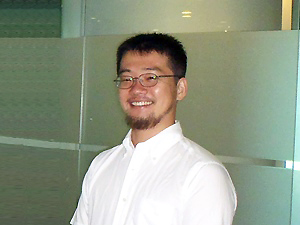
- Yuki Sakurai
- Non-Governmental Organizations, Association for Aid and Relief (AAR), Program Operation
“I want to support refugees”
It dates back to my junior high years when I started to yearn to engage in international cooperation
Now I am an adult who have a family of my own
Now I face with global and domestic issues as a member of NGO, my longed-profession
With some bumps and detours, I finally became what I am
“Act as soon as you think about it, be mentally prepared, these are what counts”
My belief is not wrong.
He is now making his dream from young adulthood comes true as if to attest his belief
I want to be a diplomat. Coming across with NGO as I learn International relations
When I was in 7th grade (second year in junior high in Japan), I was inspired by Chiune Sugiura’s TV drama and became to think that “I want to support refugees and those who are less fortunate.” To become a diplomat became my dream and I chose Chuo University to study International relationships. I was in sophomore when I knew about the activities of International NGO. I attended the lecture of then Secretary General of “Association of Aid and Relief, Japan (AAR Japan)” and learned that not just national institutes but NGO also plays a role of an actor when it comes to international cooperation. In addition, Two Treatises of Government written by John Locke impressed me a lot and this classic political studies made me think of working at NGO.
AAR Japan was established in 1979 in Japan and boast its presence as well-established NGO, making comprehensive efforts in supporting the less fortunate since then. I wanted to work at this leading NGO from the beginning but there were no new hiring at that time. So I first worked at Nuclear Safety Research Association and then went to England as an exchange student. After coming back, worked at Japan Mine Action Service (JMAS) and finally grabbed a chance to work at AAR Japan up until now. When I was working at JMAS, I was searching for a path to work at United Nations (UN) or Japan International Cooperation Agency (JICA) but I changed my mind as I work at NGO. I was lured by the benefits of working at NGO where I can build closer ties with the beneficiary, or feel the warmth of people’s kindness.
By the way, I still respect Chiune Sugihara and no doubt he is my starting point. I always take DVD of his TV drama when I go abroad in order to support my emotion.
NGO resident officer deals with multi-tasks. Tackling diversified issues depending on destinations
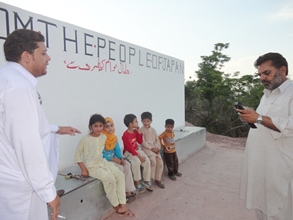
Children smiling in front of the water tank made by Japan
Being a member of AAR Japan as well as had being of JMAS, I was a resident officer of some countries in South and Central Asia and Africa. The NGO resident officer covers a broad range of duties. To give some examples, one is accounting. This duty is very important when reporting accounting to contributor of funds. Another is administration tasks such as management of local personnel or local office. Beside above tasks, we meet local executives or officials of related-bureaus to ask for their cooperation for our business or reporting the business situations as well as signing conclusions.
As these kind of administration works account for most of the duty, you might be bewildered if you draw an image of working very closely with the local people.
Major projects conducted when working as a resident officer
| Islamic Republic of Pakistan (30 -33 years old / 3 year period) I was in charge of amelioration in water quality at outskirt of Islamabad, Pakistan. At the village, woman needed to walk hours to collect water. Moreover, the water they collect is spring water so when there is not enough amount of water, they had to wait for hours there. To combat this inconvenience, we connected the water pipe from the collecting spring water point to the village and placed the water tank at the village’s public place. Thanks to this improvement business, women do not need to wait for hours any more to collect water. |
|
Republic of Zambia ( 35~37 years old/two year period) Right in the middle of such circumstances, we constructed a clinic specializing in HIV medical treatment, and visited houses of AIDS patients with an aim to urge them to come to the clinic. We also held a workshop toward AIDS patients to promote the dosing of antiretroviral drug which slows the progression of AIDS virus. We supported the implementation of awareness campaigns at schools and regions held by the clubs set up at schools to takes measures on AIDS, with an aim to decrease prejudice against AIDS patients. In Zambia, one out of six children have lost their parents because of AIDS, and AAR Japan now supports these bereaved child going to school. |
|
Republic of Tadzhikistan ( 30 years old/10 months) We conducted an inclusive education at Dushanbe, the Central City of Tadzhikistan. What it means by inclusive education is that whether one has a disabling condition or not, every children learn together at the same classroom. In Tadzhikistan, we conducted trainings for teachers in partnership with local NPO. We made some toilets in school accessible to everyone and created the environment easy to come to school using wheelchair. Furthermore, we visited houses of handicapped and explained to their parents about inclusive education so that they can let their child go school without anxiety. There once was a family that the disabled child’s father decided to go see the school immediately after our explanation, and his two brothers started to come to school where AAR Japan supports. |
What attract me about being a resident officer is that I can actually see with my own eyes the local people’s living and feel their warmth and breathe. I am simply happy to see local people’s delighted face and simply glad to hear they say thank you. I take this compliment on behalf of Japanese citizens as a staff of a group using ODA budgets and I identify my missions is to convey these efforts to Japanese people.
Another fascinating points of being a resident officer is that Japanese VIPs come to see the places. In Pakistan, I got a chance to explain the JMAS’s business status to the Minister of Foreign Affairs. In Zambia, Their Imperial Highness Prince and Princess Akishino have visited the clinic for HIV/AIDS patients that AAR Japan constructed. In Tadzhikistan, the Prime Minister Abe’s wife has visited the school AAR Japan supports.
Japanese ODA will be recognized widely across Japan through the visits of these VIPS to our activity sites. Each one of Japanese citizens can contribute to an international corporation by knowing what ODA is.
Abandon your bias to get along with residents at foreign countries
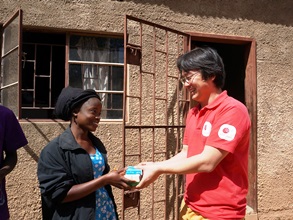
Mr. Sakurai handing soaps donated by Sompo Japan Insurance Inc. to HIV orphan
When I am asked the difficulties and issues I face at the resident country, I would say, I don’t take things difficult, I take things for granted so life here is not that challenging. (Of course everything is more inconvenient here compared to Japan). One thing I can tell is that what is common in Japan is not the same in developing countries. First, time consciousness here is different from Japan. Don’t try to proceed things in your time consciousness or you will be stressed out. I advise you that it is better for you to adjust to developing countries’ time consciousness.
For instance, provided that you are going to hold a ceremony commemorating the transfer of an institution that AAR Japan has established to the partner country’s government. In Japan, final attendances will be fixed no later than 3 days before the ceremony, considering the affiliated tasks such as asking whether one is attending or not, or requesting to give speeches to the related minister or ambassador. However, in developing countries, attendances will not be fixed until a day before the ceremony. It is not my surprise even an amendment occurs as of 4pm of a prior day. Unexpected changes require many additional paperwork so what indispensable here is the flexibility. I was also made an accusation in my previous workplace. As of now, I can laugh away of this happening but please be reminded that, if you are dealing with people, to be interested in and to have respect matters the most. Capability to use language comes the next.
If you happen to fall in love with a foreigner who cannot speak Japanese and wish to go out with him/her, I bet you will work hard to communicate with him/her. Same goes with this. I myself, too, was not a fluent speaker. Each time I organize a workshop for residents, I tell the local staffs that “speak in a sincere manner so that children and elderlies can understand, then everyone can get the picture.” People in developing countries have diverse backgrounds of education etc. Speaking more academically, it’s like you can’t make students in Faculty of Law understood the studies of science and engineering.
Although I study about the country and its businesses before I get posted, I try to abandon my pre-knowledge once I am stationed. Never push my common sense or knowledge to local people. Observing the place with transparency, I can promote new projects through listening to opinions of local people and staffs.
Furthermore, I always try to be self-critical. I keep asking myself, is my decision the best one? For example, when I am taking contact abroad from Tokyo office, I sometimes receive request from a company. On such case, I ask myself whether I am not listening too much of a company’s request. I try to stay neutral and fair. On the other hand, working at a resident country, I strongly feel that I want to help the local people so I need to keep asking myself whether I am not listening too much of the resident people’s request. I try to be objective and refuse things that are impossible as well as conveying the NPO’s vision. Of course, if the request is reasonable and necessary, I negotiate with Tokyo Headquarter for permission. I keep in mind not to support more than necessary and not to be too conservative due to respecting too much of fund contributors or Tokyo Headquarter.
Attracted by the privilege of directly communicating and listening to local people’s “voice”, as well as meaningfulness of conveying
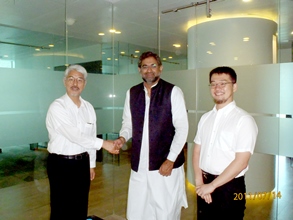
Courtesy visit to a Pakistani Member of Parliament from the project area
AAR Japan continues to support victims of the Great East Japan Earthquake.
Examples of Recent Businesses;
◇”Get vitalize together with the community” project that physical therapists and occupational therapists perform massage to the elderlies who live in temporary housing
◇Supporting the facilities for disabled people in Tohoku 3 prefectures (Iwate, Miyagi, Fukushima) to promote sales of materials and equipment and products, with the funds donated by AEON customers and raised by matching gift program of AEON 1% Club Foundation.
◇With the cooperation of The Sumitomo Foundation, AAR Japan organized the tour for parents and children living in Soma region in Fukushima, to engage in outdoor activities to move their body. The activity took place in West Aizu, where the effect of radioactive ray is mere.
Among these victim supporting activities, I engage in logistics such as accounting or designing such businesses. I am also in charge of negotiations with external companies and responsible in reporting such events to the sponsor entities and contributor of funds. Action toward companies where AAR Japan has no relationship yet, is to I explain who we are and what we do as well as asking for their supports. This job is worth working listening to the beneficiaries’ voices directly and delivering it to donators and individual supporters.
AAR Japan is just an intermediate entity between donator/supporter and beneficiary. What we are required is to make the supporter’s wish come true; “please make good use of our asset in a way that help less fortunate in the world.” Once the contribution business is over, we report to the supporter. We always engage in contribution businesses in a way that supporters feel happy to have given over to us.
I have been working as a NGO officer not just abroad but in Japan, too. The difference I feel between the world and Japan can be said the strength of “community-base.” In developing countries, the strength of human network matters a lot whether your business proceed smoothly or not. To establish this network, a relationship based on trust is very important. You may get betrayed on rare occasions, but if you cautiously observe the other and put trust in, it is possible to establish trust relationship with the local people.
From the perspective of “bond,” I felt strong ties between families in Pakistan and Tajikistan where Muslim make up the majority of the country. According to my boss aged nearly 70 and worked together in Pakistan, Pakistan is “same as Japan when I (the boss) was little, the only difference is that everyone here has cell phone. If there are many siblings, the elder one takes care of younger one. Just like in Japan decades ago.
At the country I worked as an expatriate, the local staff tells me that they want their own country to develop like Japan. My answer is “to develop means to lose many precious things you have now.” However, their reply is “we want development even we lose something.” I am not sure which is better for a human beings… who knows?”
I want to increase the value of NGOs as a working place, like in America
Right now, I have two major goals. One is to prove that NGO officers can make a living just like other occupations. There are people who quit and change job saying they can’t maintain a family in NGOs. For those who leave a job because of financial reason, I want to prove that there is no problem at all living as a NGO officer.
In FY2010, educational NPO, “Teach for America” was ranked top as the most popular place to work for American literature departments’ students. Three NGO/NPO organizations were ranked in the top 10. In future, maybe around 15 to 20 years later, I am happy if there are no differences in value concept whether you are working at trading companies or NGOs in Japan. Unfortunately, as of now, it is still hard to work at NGO and provide family so I want to change such understanding. This is my second ambitious goals.
Japanese NGOs are vulnerable in terms of its financial base compared to overseas NGOs. As a matter of fact, unfortunate situations such as the most needed people cannot gain benefits may occur. The third sector, NGOs, play the important role of supplementing tasks that the government and public institutions, the first sector, and private institutions, the second sector, fail to cover and contribute to establish a better society.
I believe students reading this article will be active in various fields from now on. It is my greatest pleasure if you could help NGOs from your specializing fields so as the field of NGO as a whole can see the sustainable growth.
Once you decide, move into action; Clue to cultivate the future
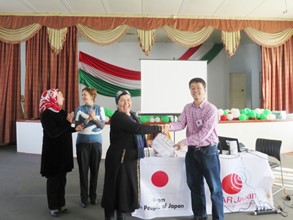
Certificate of completion of training for teachers in Tajikistan
In my student days, I was participating in volunteer organized by the citizen group that supported learning of foreigners living in Japan. I was preparing Articles of the Group together with Chuo University Faculty of Law’s senior student. My senior taught me in an easy-to-understand way, that I learned from this senior that clever person can teach in an easily understood manner in a simple words. I was impressed with this finding and it has changed my way of thinking.
What I want to say to students who are seeking jobs is to “take it easy.” If you study hard, you can choose the university you are interested in and pave your way, but when it comes to job seeking, it is a matter of compatibility. Keep challenging until you get to meet a company you think it fit well. At the company I worked first, I spent my days asking to myself, “am I ok with here?” My parents used to tell me that few people can be a professional in the field one prefers, but I was skeptical in such opinion. That is why I decided to be an exchange student at the graduate school in England at the age of 27. Some Japanese may think that 27 is too old to be a student, however, to my surprise, there were 60 years old students in the graduate school I went. Thanks to such experience, I believe that taking actions when you decided is what matters.
In addition, I was anxious since I did not have any special qualifications which will be an advantage when seeking job at NGO. Then, a European acquaintance of mine told me that “NGO is not a place that every workers possess some kind of special qualifications. There are workers who is in charge of logistic, and actually, logistic is the core part of NGO.” Being an exchange student was also a big event in my life that changed my sense of value. Everything and every time we challenge, we need to be mentally prepared!
Enjoy the privilege of being a student! Keep challenging on things you can only do now. Have your dream; think deeply what and how you wanted to be in 10 or 20 years later. This way of thinking will help you when seeking jobs or when you become a manager of a company and need to create business plan; “what should our company be like in 10 to 20 years from now on and how will that be accomplished?”
My recommendation to those who wish to work in the field of international cooperation, especially in NGO, is that “come to this field after experiencing various fields. “ There is not such area of “this particular field is the best to experience before working at NGO or international cooperation fields. It can be any. Every kinds of experience matters on the site of international cooperation. To tell the truth, those who have experiences in different fields can approach the issues from different point of view. Various perspectives are very important at the scene of international cooperation. When seeking jobs in Japan, enjoy the privilege of “a new graduate hiring”.
■BIOGRAPHY■
Association for Aid and Relief, Japan (AAR Japan)
Yuki Sakurai
After Graduating Faculty of Law of Chuo University in 2001, he commenced employment at Nuclear Safety Research Association and worked at Radiation Disaster Medical Research Center. From 2006 to 2009, he became an exchange student at University of Leeds and Postgraduate of University of Bradford to study irenology. After coming back to Japan, he gained job at The Certified Specific Non-Profit-Organization Japan Mine Action Service until 2012 where he was sent to Pakistan Office. From 2012, he engaged in businesses at Republic of Zambia and Republic of Tajikistan, and finally come back to Tokyo Headquarter in August 2016 to be in charge of Tohoku business.
